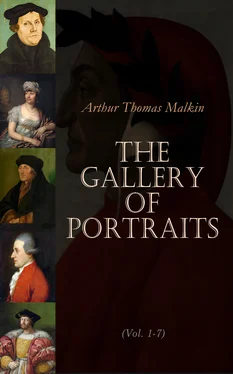After the lapse of three years the voyagers returned home, and were received with lively interest by all classes of society. Part of their collections were lost through an accident which happened to the vessel: but the greater portion was preserved, and their novelty and beauty excited the admiration of naturalists. George III., who delighted in everything connected with horticulture and farming, manifested a warm interest in inquiring into the results of the expedition, and conceived a liking for the young traveller, which continued unimpaired even to the close of his public life.
It was Mr. Banks’s intention to accompany Captain Cook in his second voyage, in 1772: but the Navy Board showed no willingness to provide that accommodation which the extent of his preparations and the number of his scientific followers required, and he gave up the project, which indeed he could not satisfactorily execute. In the summer of that year he went to Iceland. Passing along the western coast of Scotland, he was led to visit Staffa, in consequence of local information; and to his description that singular island was first indebted for its general celebrity. He spent a month in Iceland. An account of this visit has been published by M. Von Troil, a Swedish clergyman, who formed one of the party. On this, as on other occasions, Mr. Banks, unwearied in quest of knowledge, seemed careless of the fame to which most would have aspired as the reward of their labours. Of none of his travels has he himself given any account in a separate publication; indeed, a few papers in the Horticultural Transactions, and a very curious account of the causes of mildew in corn, not printed for sale, constitute the mass of his published works. But his visit was productive of much good to the Icelanders, though it remained uncommemorated in expensive quartos. He watched over their welfare, when their communication with Denmark was interrupted by war between that country and England; and twice sent cargoes of corn, at his own expense, to relieve their sufferings in seasons of scarcity. His benevolence was warmly acknowledged by the Danish Court.
Returning to England, Mr. Banks, at the early age of thirty, entered on that tranquil and useful course of life, from which during a long series of years he never deviated. His thirst for travel was checked or satiated; he undertook no more distant expeditions, but he ceased not to cultivate the sciences, for which he had undergone so many hardships. It was long hoped that he would publish some account of the rich harvest of vegetable productions which he had collected in the unknown regions of the Pacific; and for this purpose it was known that he had caused a very large number of plates to be engraved at a great expense: but, most probably owing to the death of Solander, these have never been given to the world. But if he hesitated to communicate himself to the public the results of his labours, in amends his museum and his library were placed most freely at the command of those who sought, and were able to profit by his assistance; and to these sources many splendid works, especially on botany, have mainly owed their merits, and perhaps their existence.
From the period of his return from Iceland Mr. Banks took an active part in the affairs of the Royal Society. His house was constantly open to men of science, whether British or foreign, and by the urbanity of his manners, and his liberal use of the advantages of fortune, he acquired that popularity which six years afterwards led to his election as President of that distinguished body. Two or three years afterwards a dangerous schism had nearly arisen in the Society, chiefly in consequence of the unreasonable anger of a party of mathematicians, headed by Dr. Horsley, afterwards Bishop of St. David’s, who looked with contempt on sciences unsusceptible of mathematical proof, and loudly exclaimed against the chair of Newton being filled, as they phrased it, by an amateur. It would be little profitable to rake up the embers of an ancient and unworthy feud. We shall only state therefore that Banks was elected in November, 1778; that for some time a violent opposition was raised against him; and that in January, 1784, the Society, by a formal resolution, declared itself satisfied with the choice which it had made. Horsley and a few others seceded, and for the rest of his life Banks continued the undisputed and popular president; a period of forty-one years from the epoch of his election.
We have said that at an early age Mr. Banks was fortunate in gaining the royal favour; marks of which were not wanting. In 1781 he was created a baronet; in 1795 he received the Order of the Bath, then very rarely bestowed upon civilians and commoners; and in 1797 he was made a Privy Councillor. The friendship between the King and the subject was cemented by similarity of pursuits; for the latter was a practical farmer as well as a philosopher, and under his care the value of his estates in Lincolnshire was considerably increased by improvements in the drainage of that singular country, in the direction of which Sir Joseph took an active part. He is said to have possessed such influence over the King’s mind, that ministers sometimes availed themselves of it to recommend a measure unpalatable to their honest but somewhat obstinate master. We know not whether this be better founded than most other stories of back-stairs influence, easily thrown out and difficult to be refuted: it is at least certain that if Banks possessed such power, he deserves great credit for the singular moderation with which he used it. For himself he asked and received nothing: fortunately his station in society was one which renders disinterestedness an easy, if not a common virtue. His influence was directed to facilitate scientific undertakings, to soften to men of science the inconveniences of the long war of the Revolution, to procure the restoration of their papers and collections when taken by an enemy, or the alleviation of their sufferings in captivity. The French were especially indebted to him for such services. It is said by an eminent member of the Institute, in his Eloge upon Banks, that no less than ten times, collections addressed to the Jardin du Roi at Paris, and captured by the English, were restored by his intercession to their original destination. He thought that national hostility should find no entrance among followers of science; and the delicacy of his views on this subject is well displayed in a letter written on one of these occasions to Jussieu, where he says that he would on no account rob of a single botanical idea a man who had gone to seek them at the peril of his life. In 1802 the National Institute of France, being then re-modelled, elected him at the head of their Foreign Associates, whose number was limited to eight. Cavendish, Maskelyne, and Herschel were also members of this distinguished list. In replying to the letter which announced this honour, Sir Joseph Banks expressed his gratitude in terms which gave offence to some members of that distinguished Society over which he himself presided. This exposed him to a virulent attack from an anonymous enemy, who published the letter in question in the English papers, accompanied by a most acrimonious address to the author of it; prompted, it is evident, not so much by a reasonable and patriotic jealousy, as by ancient pique, and a bitter detestation even of the science of revolutionary France.
Towards the close of life Sir Joseph Banks, who in youth had possessed a robust constitution, and a dignified and prepossessing figure, was grievously afflicted by gout. He endured the sufferings of disease with patience and cheerfulness, and died May 19, 1820, leaving no children. Lady Banks, whom he had married in 1779, survived him several years. His magnificent library he devised to the British Museum; and among other bequests for scientific purposes, he left an annuity to Mr. Frederic Bauer, an artist whom he had long employed in making botanical drawings from the garden at Kew, upon condition that he should continue the series.
Читать дальше












